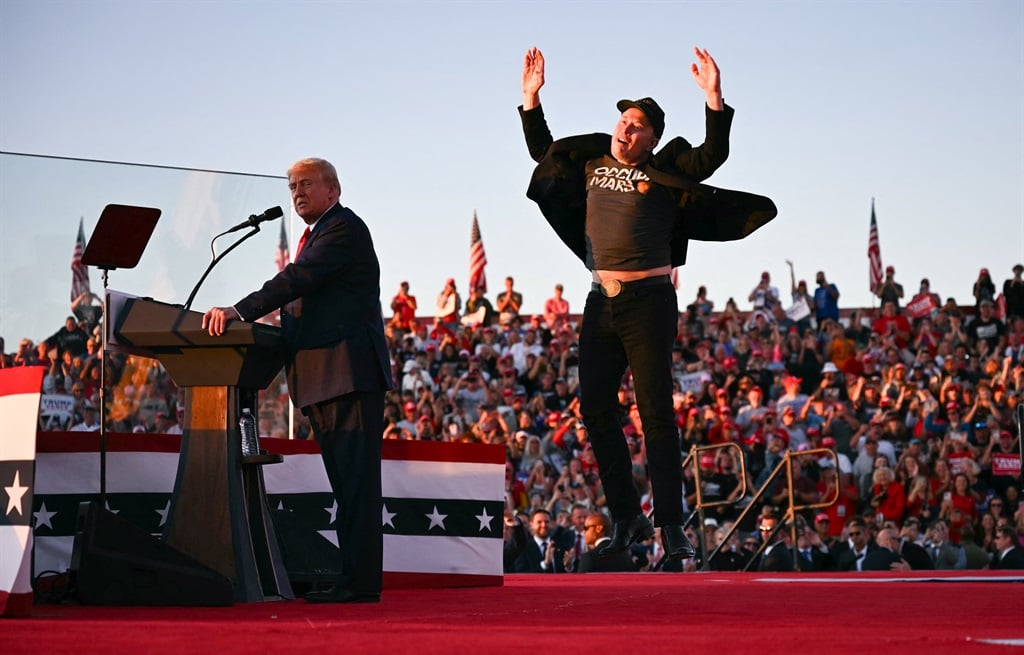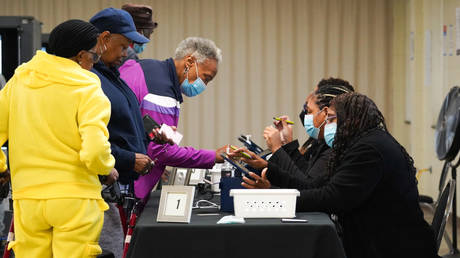The Victoria’s Secret fashion show is set to return Tuesday for the second time after a four-year hiatus.
Victoria’s Secret media relations
Victoria’s Secret is the largest lingerie retailer in the US, and has been for several decades.
After explosive success, it had several stumbles but has since overhauled its brand image.
The brand is bringing back its Victoria’s Secret Fashion Show on Tuesday night.
Victoria’s Secret is back — or it’s at least making a play for a big comeback.
The lingerie retailer has been an industry leader in the US for several decades. But in recent years, the lingerie brand faced sluggish sales, criticism for its lack of model diversity and size inclusivity, scandal over its former CEO’s ties to Jeffrey Epstein, and an entire brand-image overhaul.
For the second time since 2019, Victoria’s Secret is bringing back the fashion show it once broadcasted annually. Unlike the 2023 show, which was part documentary-style, the 2024 show will be streamed live on Prime Video on Tuesday at 7 p.m. EST.
The lingerie retail space also started to shift in a new direction — veering from push-up bras and skinny models to sports bras and a more body-positive image. Lingerie competitors, including Aerie, ThirdLove, and Lively, started to attract more interest from consumers, and sales at Victoria’s Secret began to slip.
Then the brand ended its fashion show in 2019, following controversial comments about transgender models from its former marketing chief. But, after launching new marketing campaigns and the VS Collective, a group of female activists and entrepreneurs, the Victoria’s Secret fashion show (reimagined) made a comeback in 2023.
Here’s a look at the rise and fall of Victoria’s Secret, and the brand’s plan for redemption.
Wikimedia Commons
Inspired by an uncomfortable trip to a department store to buy underwear for his wife, Raymond set out to create a place where men would feel comfortable shopping for lingerie. He wanted to create a women’s underwear shop that was targeted at men.
Victoria’s Secret
His vision was summed up by Slate’s Naomi Barr in 2013: “Raymond imagined a Victorian boudoir, replete with dark wood, oriental rugs, and silk drapery. He chose the name ‘Victoria’ to evoke the propriety and respectability associated with the Victorian era; outwardly refined, Victoria’s ‘secrets’ were hidden beneath.”
He went on to open a handful of Victoria’s Secret stores and launched its famous catalog.
Getty/Astrid Stawiarz / Stringer
Wexner, who founded L Brands (formerly Limited Brands) was already making a name for himself in the retail world as he gradually built up an impressive empire.
By June 1982, Limited — which had previously acquired Express and Lane Bryant — was listed on the New York Stock Exchange. One month later, under Wexner’s leadership, the company acquired Victoria’s Secret’s six stores and its catalog for $1 million.
Nicholas Hunt/Getty
He was closely following the European lingerie market of that time and wanted to bring this aesthetic to the US. So, he set out to create a more affordable version of the European upscale brand “La Perla” — lingerie that looked luxurious and expensive but was affordable.
AP Photo/Adam Nadel
Source: The Telegraph
AP Photo/Terry Gilliam
The show, which was run by Ed Razek (longtime chief marketing officer of L Brands), became an iconic part of the brand’s image.
Razek and his team were responsible for hand-picking the models to walk the show. Because of this, he became one of the most important people in the modeling world, helping to launch the careers of Gisele Bündchen, Tyra Banks, and Heidi Klum.
AP Photo/Mark Lennihan
Source: Time
Evan Agostini/Getty Images
Body by Victoria was a “blockbuster success” and more than doubled the sales volume of any other bra that Victoria’s Secret had previously launched, Michael Silverstein wrote in his book, “Trading Up.”
Victoria’s Secret
It was tradition for an Angel to wear a Fantasy Bra” at every runway show starting in 1996. They changed each year.
YouTube/Derek Dahlsad
Razek hired the best photographers and television directors in the world to make commercials for the brand.
AP Photo/Stephen Chernin
AP Photo/Richard Drew
According to reports at the time, Turney wanted to remove the “hooker looks” in the catalog and made the aesthetic more like Vogue than Playboy.
Dimitrios Kambouris/Getty Images
Under her nine-year tenure, the company thrived; sales increased by 70% to $7.7 billion.
Jay LaPrete/AP
Wexner made a series of quick and fast changes: killing the catalog, swimwear, and apparel to focus solely on lingerie, the core part of its business.
He also split the brand into three — Victoria’s Secret Lingerie, Victoria’s Secret Beauty, and Pink — and recruited a CEO for each division.
Courtesy of Spanx
Singer spent over a decade at Nike and was CEO of Spanx before she joined Victoria’s Secret.
AP Photo/Mary Altaffer
Victoria’s Secret was slow to adjust to a shift from padded and push-up bras toward bralettes and sports bras, missing out on a major fashion trend.
Facebook/Aerie
Victoria’s Secret was accused of failing to adapt to the times. Between 2016 and 2018, its market share in the US dropped from 33% to 24%. Some shoppers complained that the quality of its underwear had slipped.
Business Insider/Mary Hanbury
“We believe Pink is on the precipice of collapse,” Jefferies analyst Randal Konik wrote in a note to investors in March 2018, commenting on the level of promotions in store.
Some parents complained that Pink was being brought down by Victoria’s Secret’s over-sexualized ads.
AP Images
In November 2018, Ed Razek, then-chief marketing officer of L Brands, made controversial comments about transgender and plus-size models.
Getty Images/Dia Dipasupil
“It’s a 42-minute entertainment special. That’s what it is,” he said in the interview.
Razek made a formal apology online but some of his critics called for him to step down.
Evan Agostini/AP
Singer was replaced by John Mehas, who took over the role at the start of 2019.
Mehas had his work cut out for him. Same-store sales at Victoria’s Secret were down 3% in 2018, and the retailer was gradually losing market share to new companies.
Plus, he had angry shareholders to deal with. In March 2019, activist shareholder Barington Capital sent a letter to Wexner, laying out recommendations to improve growth at Victoria’s Secret and called out the company’s brand image as being “outdated.”
AP Photo/Jay LaPrete
It seems Victoria’s Secret took this criticism to heart. After acknowledging the letter in a statement, it appointed two new female board directors — Sarah E. Nash and Anne Sheehan — and made steps to address the comments about the brand image being outdated.
Charles Sykes/Invision/AP
While she is not a plus-size model, fans praised the company for its decision to take on Hungarian model Barbara Palvin as one of its newest Angels.
Instagrammers celebrated a post starring Palvin for being more body-inclusive, as they perceived her to be curvier than some of the brand’s other models.
“This model actually looks healthy..& I’m loving it!” one Instagram user wrote.
Arturo Holmes/Getty Images for Victoria’s Secret
Brazilian transgender model Valentina Sampaio, shared a photograph of herself on Instagram in August 2019, tagging the Victoria’s Secret Pink brand along with the hashtags: “campaign,” “vspink,” and “diversity.”A day later, she shared a video of herself with the caption “Never stop dreaming.”
Her agent later confirmed that she had signed a contract with Victoria’s Secret. Sampaio is expected to hit the runway for the 2024 show.
“Today Is the day!!! Finally after 6 years since my first VS casting, today the dream will come true,” she wrote in an Instagram post on Tuesday.
Astrid Stawiarz/Getty Images for Fragrance Foundation
Razek ran the fashion show, so its future seemed unclear at the time of his departure.
Dimitrios Kambouris/Getty Images
At the time, L Brands CFO Stuart Burgdoerfer told analysts that the fashion show didn’t have a big impact on boosting sales at the brand.
Astrid Stawiarz and Patrick McMullan/Getty Images
Epstein managed Wexner’s money for several years, and former company executives told the Wall Street Journal that he tried to meddle in Victoria’s Secret’s business, offering input on which women should be models.
Some of Epstein’s victims came forward saying that he used his connection to Victoria’s Secret to coerce them into sexual acts.
L Brands’ board of directors announced that it had hired an outside law firm to review its relationship with Epstein, who died by suicide in jail in August 2019.
In September, Wexner addressed his ties to Epstein at L Brands’ investor meeting. “At some point in your life we are all betrayed by friends,” Wexner said. “Being taken advantage of by someone who was so sick, so cunning, so depraved, is something that I’m embarrassed I was even close to. But that is in the past.”
Jay LaPrete/AP Images
Still, he’d stay on as chairman emeritus and sit on the board of directors. At the same time, it announced that it was selling a 55% stake in Victoria’s Secret to private-equity firm Sycamore Partners.
In a statement to the press announcing the news, Wexner said that Sycamore has “deep experience in the retail industry and a superior track record of success,” and that it “will bring a fresh perspective and greater focus to the business.”
Victoria’s Secret
In April 2020, Sycamore filed a lawsuit to back out of the deal, alleging that Victoria’s Secret’s actions taken during the pandemic to close stores, cut back on new inventory, and not pay rent for the month of April were in violation of the agreement that the two parties had made in February.
L Brands immediately issued a statement saying that a termination of the agreement is “invalid,” and that it would “vigorously defend” the lawsuit and “pursue all legal remedies to enforce its contractual rights.”
REUTERS/Brendan McDermid
L Brands said that it had come to a “mutual agreement” with Sycamore to “terminate” the deal.
The company also said that it had reshuffled its management team and would focus on “implementing significant cost reduction actions and performance improvements at Victoria’s Secret.”
This included permanently closing as many as 250 Victoria’s Secret and Pink stores in the US and Canada in 2020.
Mike Kemp/In Pictures via Getty Images
Jefferies analysts described Victoria’s Secret’s progress as “admirable” after it reported strong fourth-quarter earnings in early 2021.
Bloomberg later reported that L Brands had resumed discussions to sell the brand once more and was seeking a much higher valuation in the region of $3 billion.
But in May of that year, L Brands put an end to speculation and said that it was no longer looking for a buyer and would split the company in two and spin off Victoria’s Secret to become a standalone business.
Courtesy Dan Schawbel
It overhauled its brand image – swapping its Angels for a new group of activists and entrepreneurial women to be the face of the brand.
Kypros/Getty Images
The series delved into Wexner’s ties with Jeffrey Epstein and said that questions remained about the nature of their relationship.
Happy Nation
It also began selling Victoria’s Secret beauty products and underwear on Amazon.
Getty Images
The company is constantly innovating “in all spheres of the business,” a spokesperson for Victoria’s Secret previously told Business Insider, adding: “This will lead us into new spaces like reclaiming one of our best marketing and entertainment properties to date and turning it on its head to reflect who we are today.”
Courtesy of Victoria’s Secret
By fall 2023, the retailer said it would release a “reimagined version” of its Victoria’s Secret fashion show in the form of a movie, alongside a live fashion event.
“This film is the ultimate expression of the Victoria’s Secret brand transformation,” Raúl Martinez, creative director at Victoria’s Secret, said in a statement. “It will be driven by fashion, glamour, and entertainment with a nod to beloved iconography from the past but in a bold, redefined way.”
Lionel Hahn/Getty Images
In July 2023, supermodel Bella Hadid announced her participation in a Victoria’s Secret campaign on her Instagram, a post that attracted a mixed-bag of responses online. Some online commenters said the campaign was “perpetuating body dysmorphia to young women” while others defended the campaign.
Mikael Jansson/Victoria’s Secret and Greg Swales/Skims
In August 2023, Victoria’s Secret debuted a campaign that featured Naomi Campbell, Gisele Bündchen, and Adriana Lima, alongside other supermodels from the late ’90s and early 2000s as well as newer faces to the modeling scene.
The brand also traded in its “Angels ” label, though, and named its campaign “The Icon” — similarly titled to a Skims campaign from the year before titled “Icons.” The similarities didn’t end there: both campaigns included Victoria’s Secret models from earlier eras, and both included photos with comparable overexposed lighting and editing styles.
Taylor Hill/Getty Images
The show received mixed reactions. Although Victoria’s Secret was praised for its attempt to appeal to a wider audience, it lacked one important aspect for a fashion show: a runway.
Instead, the live fashion event was a premiere, of sorts, for the film released on Prime Video days later.
Taylor Hill/WireImage via Getty Images
As Gen Z continues its obsession with the early 2000s, the styles of that time are making full-fledged comebacks. From ballet flats to trucker hats, Gen Z shoppers are searching for the y2k aesthetic.
Victoria’s Secret reported that its quarterly operating income grew for the first time since 2021 in second quarter earnings report for 2024.
Arturo Holmes/Getty Images for Victoria’s Secret
Models arrived Tuesday morning to begin prepping for the live runway. The show will feature musical guests and a runway presentation — similar to how it was done before the 2019 cancellation.





+ There are no comments
Add yours